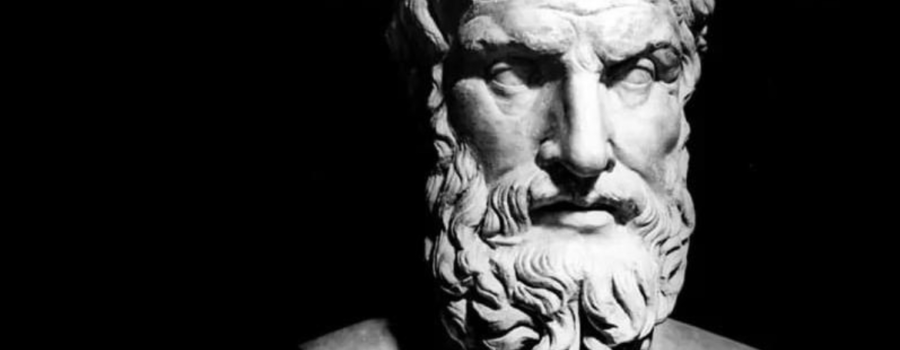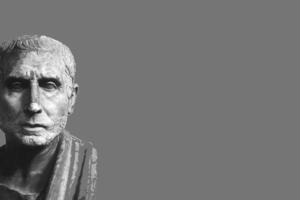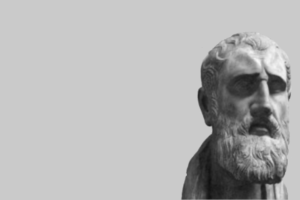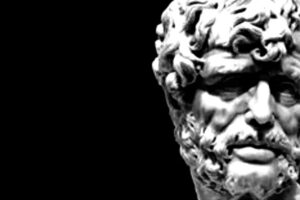Epictetus is considered as one of the most influential Late Stoa Period philosophers. He lived from about 50 to 135 AD. He was born into slavery in a major Greco-Roman city in what today is southwestern Turkey, but moved at an early age to Rome by his master. Epictetus was the slave of Epaphroditus, who he mentions several times in his discourses, not exactly in complimentary terms, but not with any hint of bitterness.
Epaphroditus is famous for more that just being Epictetus’ master. A former slave himself, after gaining his freedom he rose to the position of Roman Emperor Nero’s secretary. Epaphroditus, recognizing his slave’s intellectual abilities, recommended the young Epictetus to study with the great Stoic teacher Musonius Rufus and, clearly, Rufus influenced the younger man greatly as Epictetus’ thought seems almost identical to some of the fragments we have of Musonius Rufus. Rufus considered Epictetus to have a keen mind and trained him well in the discipline of Stoic philosophy.
Epictetus often referred to himself as ‘a lame old man’, but never elaborates on the cause of his condition. There is conflicting accounts on the cause and it is likely it will forever remain a mystery. The most common tradition is that Epictetus broke his leg during a wrestling match with his sadistic master and it rendered him crippled for life. Other traditions state Epictetus as born handicapped or had rheumatism or arthritis.
His social rank increased as a result of his increased education. His training under Musonius Rufus would become the focus of his life’s work. Epictetus was granted his freedom by his master around the time that Nero, the Roman Emperor, died in 68 AD. Although a young man at the time, probably in his early twenties, he started to lecture on philosophy in Rome. During this time he gained considerable notoriety to include advising Emperor Hadrian on the concepts and principles of Stoicism.
He taught in Rome for roughly a quarter of a century before Roman Emperor Domitian order all philosophers into exile. Domitian was suspicious of dissent from the philosophical schools: he had apparently expelled philosophers in 88/9 AD and did so again in 93 AD when he expelled the philosophers not only from the city of Rome but from all of Italy.
Epictetus relocated to Nicopolis in northwest Greece , where he established a school of philosophy. He remained in Nicopolis for the rest of his life. His most well-known student, Arrian, studied under him while he was a young man (around AD 108), and he asserted that the notes he took on Epictetus’ lectures served as the basis for his renowned Discourses and Enchiridion.
When speaking, Epictetus had the ability to “induce his audience to feel exactly what Epictetus wanted him to feel,” according to Arrian. Many influential people sought him out for conversations. He was friends with Emperor Hadrian, who may have heard him speak at his Nicopolis school. There are no known texts by Epictetus. His student Arrian (86/89 -about 146/160 AD) wrote down and collected his speeches. The Discourses, the primary text, has four books that have been preserved (out of the original eight).
He led a very simple life and owned few things. He spent a lot of time alone, but in his latter years he took in a friend’s abandoned child and raised him with the help of a woman. It’s uncertain if she and Epictetus ever wed. He passed away around the year 135 AD.
His Teachings
Epictetus believed that the only way to live in harmony with nature was to master oneself. Self-mastery is the ability to utilize reason and lead a moral life. Above all, Epictetus’ philosophy was a practical one that aimed to assist people in leading happy and fulfilling lives. Epictetus thought that self-knowledge was essential to philosophy. He stressed the difference between things we can control—those that are within our power—and things we cannot control—those that are beyond our control. Learning to recognize these things is a necessary component of self-knowledge.
Epictetus asserted that we should only worry about the things that we have control over, which includes our own thoughts and deeds. Every person’s ultimate goal in life is to live in harmony with nature’s “Universal Harmony.” We all have a role in life, and we must each fulfill it. We have no control over the role fate places us in or the things that happen to us, but we do have control over how we choose to respond.
He taught that we ought to accept our fate and express gratitude for being alive. How carefully we adhere to the path that the gods have prescribed for us determines how happy we will be. For Epictetus, reason also plays a significant part in the creation of human freedom. We are capable of making important decisions and accountable for our deeds. Humans possess the capacity to form constructive opinions and to reject unhelpful ones. They can control their thoughts and feelings as a result, leading happy and fulfilling lives. A person is only truly free to the extent that they have developed self-control and live morally. We cannot take charge of our life unless we learn to control our emotions and examine our thoughts.
Influence
The former slave’s philosophy has had a significant influence on Western Civilization. Many think he developed the most logical and cogent kind of stoicism, one that provides actual useful guidance on living an ethical life. The renowned Marcus Aurelius was significantly influenced by Epictetus and is often cited in Aurelus’ classic, Meditations. The Enchiridion was popularized when it was translated into Latin in the fifteenth century. Many Christian humanists thought that Epictetus’ ideas were in line with what Christ had to say, and both Pascal and Descartes were enthralled by his arguments.
Since Marcus Aurelius, whose Stoic reflections gave him comfort in times of adversity, the former slave’s thought has gained traction in psychology, with effective approaches to treatment like Cognitive Behavioral Therapy becoming more and more well-liked. The former slave’s teachings also had an impact on the development of early Christian moral thought. The whole list of his influence is endless. What stands out the most is how a former slave attempted to impart to others the lessons that genuine freedom ultimately belongs to the rational mind and that being in charge of oneself makes one unconquerable.









Most Commented Posts